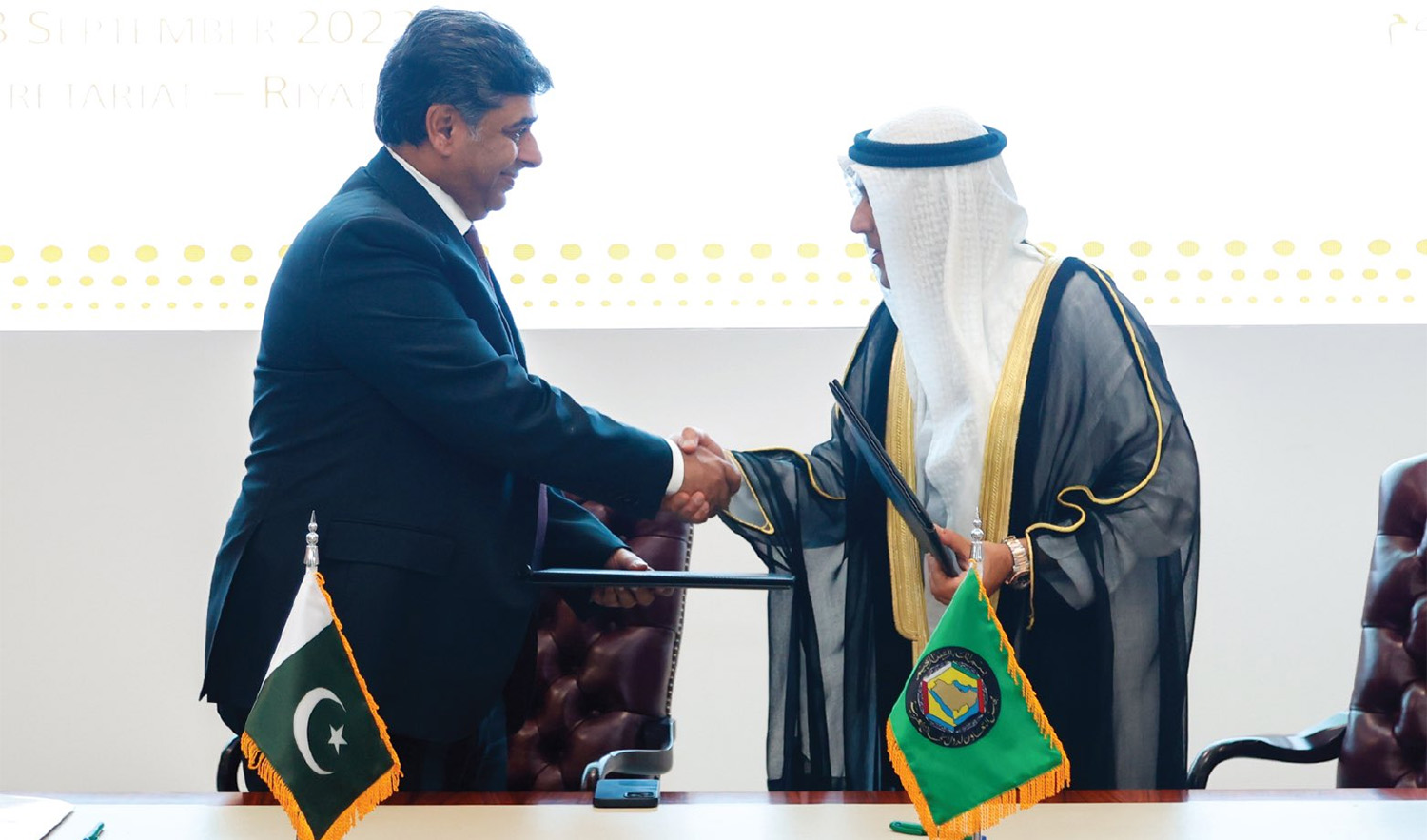https://arab.news/453k8
- Pakistani commerce ministry calls deal “milestone in both sides' economic cooperation”
- FTA to enhance Pakistani exports to GCC nations through the removal of trade barriers
KARACHI: Pakistan and the Gulf Cooperation Council (GCC) have signed a “preliminary” free trade agreement (FTA), Pakistan’s commerce ministry announced on Friday, calling it a “milestone in both sides' economic cooperation.”
The preliminary FTA was signed by the Secretary General of the GCC, Jassem Mohamed Albudaiwi, and Dr. Gohar Ejaz, Minister of Commerce for Pakistan, on Thursday at the headquarters of the General Secretariat in Riyadh.
Last year, both sides held technical-level talks to examine the possibility of signing a free trade agreement that could help Pakistan boost its exports to the six-country bloc, which includes Saudi Arabia, the United Arab Emirates, Bahrain, Oman, Qatar, and Kuwait. In March this year, a delegation of senior Pakistani diplomats met top GCC officials in Riyadh to discuss the agreement’s modalities. Last week, the foreign minister of Pakistan also met the GCC Secretary General and called for the “early conclusion” of the FTA.
“This is a significant development as the FTA is the first by GCC with any country since 2009 and marks a milestone in both sides' economic cooperation,” the Pakistan commerce ministry said in a statement.

Secretary General of the Gulf Cooperation Council (GCC), Jassem Mohamed Albudaiwi, right, and Dr. Gohar Ejaz, Pakistan's minister of commerce shake hands after signing preliminary Free Trade Agreement (FTA) between the GCC and Pakistan in Riyadh, Saudi Arabia on September 28, 2023. (Photo courtesy: GCC)
The GCC also released a statement, saying the “historic” agreement represented “an important turning point in cooperation and would contribute to growth and prosperity in a way that serves the common interests of both sides.”
“GCC countries are moving forward with the file of free trade negotiations with other countries, aiming to open and enhance the prospects for trade and economic cooperation for the Council member states regionally and internationally.”
The preliminary deal will now be followed by an internal administrative and approval process before the final agreement is signed and comes into effect.
Muhammad Zubair Motiwala, Chief Executive Officer at the Trade Development Authority of Pakistan (TDAP), the country’s export promotion arm, called the signing of the preliminary FTA a “positive step for export growth.”
“This is a very positive development which would help Pakistan to boost its exports to GCC countries,” Motiwala, who is also the chairman Businessmen Group (BMG) at the Karachi Chamber of Commerce and Industry (KCCI), said.
Furqan Abdul Qadir, who serves as the Director of the Pakistan-Saudi Arabia Business Council at the Federation of Pakistan Chambers of Commerce and Industry (FPCCI), said the FTA would help enhance trade with Gulf nations.
“FTA is a basic tool to enhance trade between the nations and this step is very welcoming because of the future growing market of Middle East,” Qadir said. “There is huge potential for trade enhancement and investment in the GCC region as countries including Saudi Arabia are rapidly growing.”
The share of Pakistani exports to the Saudi market was very limited, Qadir said, an issue that would be addressed through the removal of trade barriers under the FTA.
Ahsan Mehanti, a director at the Pakistan-UAE Business Council at the FPCCI, said the FTA would provide a competitive level playing to Pakistan compared with its South Asian neighbors including India and Bangladesh.
“The FTA will increase trade volume with GCC nations because if we compare our trade [with GCC] with India, it is doing well in GCC, while we are lagging,” Mehanti said.
The signing of the FTA comes as Pakistan is pushing to pitch an improved business climate and its potential for foreign direct investment in a range of sectors. In June the South Asian nation set up a Special Investment Facilitation Council (SIFC) — a civil-military hybrid forum — to fast-track decision making and promote investment from foreign nations, particularly Gulf countries.
The council has identified five sectors as priority, namely agriculture, mining, information technology, defense production and energy, as Pakistan deals with a balance of payments crisis and requires billions of dollars in foreign exchange to finance its trade deficit and repay its international debts in the current financial year.
Speaking to reporters on Thursday, Foreign Minister Jalil Abbas Jilani said the SIFC forum had become “extremely popular” among international investors and was attracting interest from Middle Eastern countries.
“There are a lot of MOUs and agreements which are in the works, and we are expecting delegations from respective GCC countries very soon,” Jilani said, adding that agreements would be finalized in the fields of agriculture, information technology, mines, and minerals, energy, and defense production, mostly as joint ventures.
“This [FTA] will help us meet our export growth targets and increase investment from GCC countries in Pakistan," said Mehanti at the Pakistan-UAE Business Council.
"It will also help Pakistan to meet the objectives of the SIFC.”

